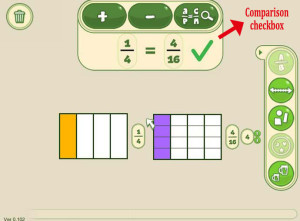At the Ruhr-Universität Bochum, we’ve had a very exciting couple of weeks. We’ve taken Fractions Lab into German schools for the first time!
Given the differences we had discovered between students in Germany and students in the UK when working with Fractions Tutor, we were very curious to see how German students’ react to this new state of the art learning environment.
Would German students react to Fractions Lab in a similar way to students in the UK?
Would German students like, love or hate working with Fractions Lab?
As you can see in the Fractions Lab screenshot below, students can work with different representations. This has two benefits (see D1.1 for more details on the effect of multiple representations):
- As the Rational Number Project (e.g., Cramer & Henry, 2002) could show, working with multiple models and representations helps students to develop conceptual knowledge about fractions.
- Furthermore, it has been shown that students appreciate being able to choose between different representations, which in turn might influence students’ motivation to engage in learning activities.

Within Fractions Lab, students work on different tasks. As young learners may have limited reading skills, the Fractions Lab tasks are automatically read out to them. Thus, students do not need to read themselves, but of course they have the option to do so.
While students are trying to solve the tasks within Fractions Lab, they receive feedback from Fractions Lab if they exhibit typical misconceptions about fractions (e.g. confusing the denominator with the numerator) or do not progress for a longer period of time.
Students seemed to appreciate that Fractions Lab was able to respond to their needs in these ways, as shown by this quote from one of the students:
I liked it, that the computer read everything to me, and that he explained everything!
A further source of help in Fractions Lab is the comparison box: After dropping two fractions into the box, the box shows whether the two fractions are equivalent or not. This tool is especially helpful, when students get confused.
It was really nice to have that box to check whether two fractions are equivalent!
We are still analysing the data and feedback from these students. Nevertheless, we are happy to present some preliminary results: You already read some quotes of students. Here are some more quotes.
These selected quotes represent the aspects that students commented on most often when asked about experiences with the Fractions Lab.
We even were able to change the colours!!!
Learning is boring. But at least this kind of learning is not as boring as the other kinds.
Changing the things [representations] and using the cups was really helpful!
Once I didn’t know what to do next and the computer helped me!
From these preliminary results, it seems clear that our sample of German students really liked working with Fractions Lab.
At this point, it is worthwhile to note, that not all German students are used to working with computers in general, and with learning technologies specifically. Some of these students already had experiences with educational technologies, some had so far only used a computer for games, and the rest had never used computers at all.
Surprisingly, these differences in prior experience with computers did not affect the quality of students’ work with Fractions Lab. We are therefore very optimistic that Fractions Lab will foster student learning across ability levels.
Come back soon to see what else we have discovered from these studies!


